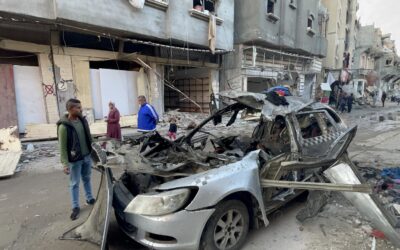
The Case For Investing in Wartime Ukraine
SUBSCRIBER+EXCLUSIVE INTERVIEW — While Ukraine deals with shortages of troops, munitions, and equipment for its air defenses, some Ukrainians are teaming up with foreign investors […] More
The danger of Donald Trump’s limited understanding of national security issues has been on display the last few days.
His shallowness, which has always been there, comes into sharper focus when you analyze his answers to some questions posed during a one-hour meeting on March 21 with the Washington Post’s editorial page board.
Take nuclear weapons.
When he announced his candidacy on June 16, 2015, Trump said, “Our enemies are getting stronger and stronger by the way, and we as a country are getting weaker. Even our nuclear arsenal doesn’t work.” He cited his reason for saying that was because “it came out recently they have equipment that is 30 years old. They don’t know if it worked.”
The U.S. triad of nuclear land- and sea-based strategic intercontinental missiles and bombers provide more than 1,500 warheads, nearly half of which are on 24/7 alert.
At the December 15, 2015 Republican debate, when Trump was asked, “”What’s your priority among our nuclear triad?” he gave the then-publicized non-answer, “”Well, first of all, I think we need somebody absolutely that we can trust, who is totally responsible, who really knows what he or she is doing. That is so powerful and so important.”
He followed that with a reference to his opposing the U.S. invasion of Iraq and the danger of nuclear weapons use tied to Syria. Trump concluded saying this: “The biggest problem this world has today is not President Obama with global warming, which is inconceivable, this is what he’s saying. The biggest problem we have is nuclear – nuclear proliferation and having some maniac, having some madman go out and get a nuclear weapon. That’s in my opinion, that is the single biggest problem that our country faces right now.”
Concern that some other leader could get a nuclear weapon didn’t stop Trump from casually tossing in his own implied threat to use nukes in a different context. During a March 9, 2016 interview on MSNBC, the Washington Post’s Bob Woodward asked how Trump would get Mexico to pay for his famous wall. Trump referred to the U.S. using two nuclear weapons to end World War II in the Pacific and added, “If they [the Mexicans] start acting up we’ll just have to watch a re-run of the Japanese episode, though that is not my first choice.”
At the Washington Post on Monday, Trump was asked, “If you could substantially reduce the risk of harm to ground troops, would you use a battlefield nuclear weapon to take out ISIS [the Islamic State]?” Apparently surprised, he struggled for an answer, saying, “I don’t want to use, I don’t want to start the process of nuclear…” and then he went off on how he is a counterpuncher and how that worked in the campaign.
When the question was asked again, he again quickly changed the subject.
The next day, when Tuesday morning newspapers focused on his apparent non answer to using nuclear weapons against ISIS, Trump changed his tune when that afternoon he was asked the same question during an interview with Bloomberg News. This time he said, “I’m never going to rule anything out, I wouldn’t want to say. Even if I wasn’t, I wouldn’t want to tell you that because at a minimum I want them to think maybe we would use them.”
There were other questionable responses on NATO, South China Sea issues, and U.S. military assistance to foreign governments, where often Trump’s facts were wrong.
One other issue emerging out of the Post interview has not received the attention it should get – Trump’s constant criticism of Angela Merkel’s Germany. It began last fall when Trump, who has stressed his plan to ban all Muslims from entering the U.S., took issue with Merkel’s opening Germany up to Middle East refugees. On CBS’ Face the Nation last October, Trump said, “I always thought Merkel was, like, this great leader. What she’s done in Germany is insane. It’s insane… letting in that many people.”
Since then there has been a steady fire of Trump criticism, which one hopes was not generated by Time Magazine choosing Merkel as Person of the Year in December when he was among the other finalists. As Trump put it in a December 9, 2015 tweet, “I told you @TIME Magazine would never pick me as person of the year despite being the big favorite. They picked a person who is ruining Germany.”
At Monday’s session at The Post, Trump said, “Why is it that Germany is not dealing with NATO on Ukraine?” The fact is Germany has taken the lead to unify the West in diplomatic and economic efforts to meet the Ukrainian crisis, including negotiations with Russia and applying sanctions on Moscow. It has not supplied military hardware.
Related Articles

SUBSCRIBER+EXCLUSIVE INTERVIEW — While Ukraine deals with shortages of troops, munitions, and equipment for its air defenses, some Ukrainians are teaming up with foreign investors […] More

SUBSCRIBER+EXCLUSIVE INTERVIEW — With a mere 1.2 million citizens, Estonia is among NATO’s smallest members, but its contributions to Ukraine have led the pack by […] More

SUBSCRIBER+EXCLUSIVE BRIEFING — Drone weapons are part of the daily narrative of the war in Ukraine – from Russia’s use of Iranian drones against infrastructure […] More

SUBSCRIBER+ EXCLUSIVE ANALYSIS — Iran’s retaliatory strikes against Israel this weekend were both a potentially game-changing, historic first — and an underwhelming response. Historic, because […] More

SUBSCRIBER+EXCLUSIVE INTERVIEW — Ukraine was hit by a fresh round of Russian missile attacks on Thursday, strikes that targeted and damaged the country’s power grid […] More

SUBSCRIBER+ EXCLUSIVE REPORTING — The Israeli drone strike that killed three adult sons (who Israel says were Hamas operatives) and four grandchildren of Hamas’s Qatar-based […] More
Search